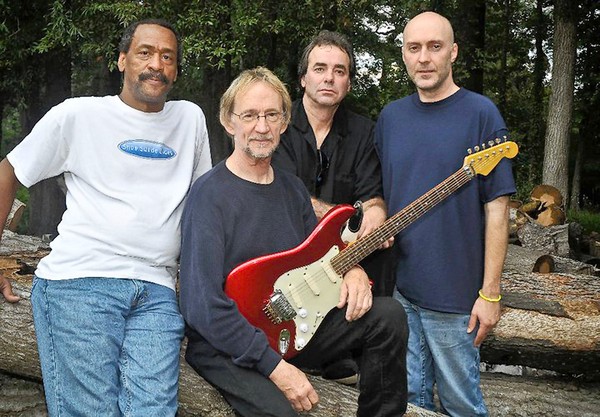Peter Tork at peace with post-Monkees career
 Peter Tork, former member of The Monkees, with his band Shoe Suede Blues. The group plays at Sellersville Theater 1894 on June 8. (CONTRIBUTED PHOTO / May 24, 2012)
Peter Tork, former member of The Monkees, with his band Shoe Suede Blues. The group plays at Sellersville Theater 1894 on June 8. (CONTRIBUTED PHOTO / May 24, 2012)
By John J. Moser, Of The Morning Call
7:24 p.m. EDT, June 2, 2012
Peter Tork figures that, had he never become a member of 1960s television pop-rock band The Monkees, he still would have had a music career.
“It would have been exactly the same,” Tork says in a recent call from his Connecticut home.
“Well, it wouldn’t have been as large and as loud, probably. That was an extraordinary phenomenon. But I would have been a folky blues-rocker solo singer-songwriter. I probably would have been playing small clubs all my life.”
But for two years on the television music-comedy show, three additional years on the road as a touring band and through several reunions, Tork was, indeed, a Monkee — part of a phenomenon that produced 11 platinum and eight gold albums and six gold singles such as “I’m a Believer” and “Not Your Steppin’ Stone.”
When Tork comes to Sellersville Theater on June 8 with his band Shoe Suede Blues — 44 years after the TV show was canceled — he’ll still be playing Monkees songs such as “Last Train to Clarksville,” though the band plays them with bluesy arrangements.
“Because we think it’s slyer that way,” he says with a laugh.
Tork even says The Monkees probably would have been back out on the road this summer, but frontman Davy Jones in February died of a heart attack at age 66. It was devastating to him and bandmates Micky Dolenz and Michael Nesmith.
“He’s always been a man of great talent and heart and I had just been hoping to work with him some more,” Tork says.
The Monkees, minus Nesmith, mounted a successful 45th anniversary tour last summer, but it stopped abruptly (a date at Mountain Laurel Center for the Performing Arts in Bushkill was canceled) amid business disputes, Tork says.
“I think, in fact, there was a strong likelihood we would have straightened it out and gone on the road again.” He says that when he, Dolenz and Jones parted after the tour, “We just said, ‘Goodbye, I’ll see you soon.’ I didn’t think I wouldn’t.”
Tork says Jones “had great talent. He was probably the most talented of us all.” Tork recalls that once, in the middle of a tour, The Monkees wanted to play a song that needed a bass player, which they didn’t have. So Jones learned bass on the spot.
“Next thing you knew, he was playing bass on stage like that night or two nights later,” Tork says. “And that kind of ability is, I think, what I’m going to miss … what I’m sorriest to see go.”
But even Jones’ death might not mean the end of The Monkees, Tork says.
Except for one Los Angeles show in 1986, a brief U.K. tour in 1997 and the band’s 1996 comeback album “Justus,” Nesmith has not performed with the band since the television show was canceled. But Tork says the three discussed the possibility after Jones’ death.
“I mean, I’m not tugging anybody’s coat, [begging] ‘Please, please, please, let’s go out as a trio,'” Tork says. “But we actually had a brief discussion. We met to honor Davy and we … you know, it’s not out of the question.”
Tork had an established music career before The Monkees. He was part of the early 1960s folk music scene in New York City’s Greenwich Village, where he was friends with others who became accomplished artists, such as Stephen Stills. It was Stills who suggested Tork audition for “The Monkees” TV show.
Tork says he thinks “The Monkees” was such a hit because when it started in 1966, young people were feeling empowered in the United States for the first time. The show was the first to show a group of young people unsupervised by older adults, and still succeeding.
“The Monkees were unique to television,” he says. “That had never happened before on television. Young adults always had senior adult to guide them through life — the vagaries of romance, and honesty and teach them life lessons, all with a little laugh on the side. … Not The Monkees.
“And that reflected the political reality at the time. See, during the Eisenhower era — and before that in World War II — the American people were pretty secure that those in charge of the wheels and levers of power could be counted on for reasonable competence. They kind of knew what they were doing. Along comes the Vietnam War, and everybody knows that those guys, who by then, had taken over the wheels of power, did not know what was going on.
Tork says The Beatles brought that same message to the wider culture, but because “The Monkees” was on television, the group “actually probably garnered even a larger audience for that point than The Beatles did.”
via Peter Tork at peace with post-Monkees career – mcall.com.
 Follow us
Follow us Join us
Join us


